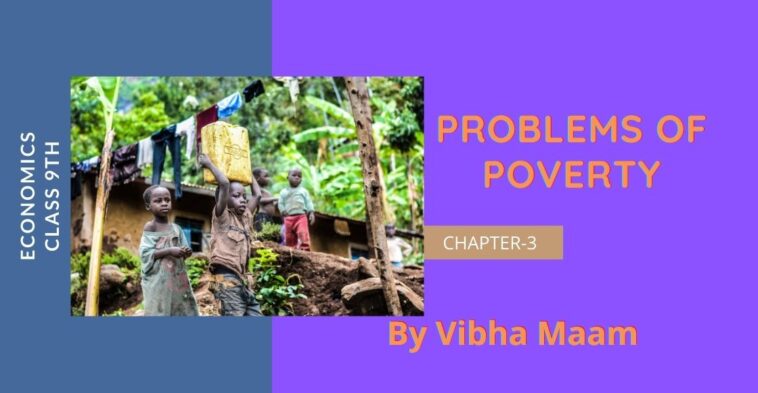Checkout handpicked notes of NCERT class 9th Economics Chapter 3 Problems of Poverty notes by Vibha Madam and don’t forget to share your valuable comments in the comment below to motivate our author.
Problems of Poverty Notes by Vibha Maam
Meaning of Poverty
Poverty is a situation in which a person is unable to fulfill their basic needs like food, clothes and shelter.
Poor people are in this situation in which they are ill- treated at almost every place in farms, factories, government-offices, hospitals, railway stations, etc.
Mass Poverty
When a large section of the people in an economy are deprived of these basic necessities that economy is said to be in mass poverty.
Poverty Line
Poverty line is a line which indicates the level of purchasing power required to satisfy the minimum need of a person.
Two methods of estimating the poverty line
i) Consumption Method
Average calorie requirement in India :- Per person 2400 calories per day in rural areas per person 2104 calories per day in urban areas
ii) Income Method:-according to planning commission report (2020)
- Current poverty line is fixed at Rs1,059.42 per month in rural areas and Rs1,286 per month in urban areas.
- Poverty lines can differ from state to state.
- The poverty line is estimated periodically, normally every 5 years by conducting a sample survey.
- These surveys are carried out by the National Sample Survey Organization (NSSO).
The International Poverty Line
World Bank uses a uniform standard for measuring global poverty line:- Minimum availability of the equivalent of $1.90 per person per day.
Vulnerable Groups
Poverty and occupation both are co-related.
- In rural areas – Peasants, casual labourers, physically challenged.
- In urban areas – Casual workers, unemployed, daily wage earners, domestic servants, rickshaw pullers,
- Social groups vulnerable – Schedule caste, schedule tribe, female infants, women, elderly people.
Inter-State Disparities
The Poorest States:- Chhattisgarh and Jharkhand.
The proportion of poor people is not the same in every state. but some states like Kerala, Jammu and Kashmir, Andhra- Pradesh, Tamil Nadu, Gujarat, Punjab and Haryana have succeeded in reducing poverty.
- Punjab Haryana have reduced poverty through agriculture development
- Kerala has focused on human resource development
- West Bengal through various land Reforms and redistribution
- Andhra Pradesh and Tamil Nadu through proper PDS.
Public Distribution System(PDS)
Supply of essential commodities to the poor people through government agencies (ration shops)at lowest prices, like wheat ,rice ,sugar, kerosene oil, etc.
Causes of Poverty
- British rule for a long period discouraged Indian handicraft and cottage industries.
- Traditional and old methods practiced in agriculture and over-dependence on monsoon decrease the rural economy.
- Heavy pressure of population
- Chronic unemployment and underemployment
- Lack of proper industrialization
- Social factors like illiteracy, large families ,caste system etc.
Removal of Poverty
Trickle down effect
- Promotion of cottage and small scale industries
- Land reforms like land ceiling, abolition of zamindari system, fixation of rents
- Promotion of cottage and small scale industries
- Income redistribution measures like taxation and subsidy.
Poverty Alleviation Programs
There are various policies, measures and programs which have been adopted by the government to remove poverty like:-
- National Rural Employment Guarantee Act 2005 (NREGA)
- National Food for Work Program (NFWP)
- The Prime Minister Employment Generation Program (PMEGP)
- Swarna Jayanti Gram Swarozgar Yojana (SGSY)
- The Pradhan Mantri Gramodaya Yojana (PMGY)
- Antyodaya Anna Yojana (AAY) December 25,2000
Don’t forget to comment in the comment section below to appreciate and motivate our author by sharing this notes with your friends you can also Contact us for any query or if you are interested in writing with us.
Use Canva for amazing images.
Stay tuned for more amazing stories, poems & articles like this.
For sponsor any article or your article you can mail us with your logo ready and details.




thank you maam